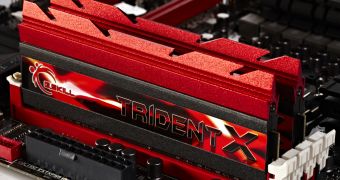After years of downward price advancements, dynamic random access memory finally stabilized in the first half of 2012, and the opposite phenomenon is about to start, if we are reading the signs right.
For a long time, DRAM chips, modules and kits outstripped supply by a great margin, causing manufacturers to reduce prices in an attempt to boost sales.
The method didn't really work, but there wasn't anything else to try by that point, so they went with it and kept cutting prices until they couldn't afford to anymore.
The situation was bad enough that Elpida, one of the primary names on the segment, went bankrupt. Now, though, the situation has begun to reverse, according to analyst firm IHS iSuppli.
Companies have toned down production capacity and don't seem to be rushing new manufacturing nodes out the door anymore.
As such, with average 1 Gb DRAM chip price having gone up 1.5% in the second quarter of the year (April-June, 2012), the stage is set for further positive evolution as demand exceeds inventories.
The third quarter (July-September) is expected to push the ASPs up by another 7.7%, with a further 3.5% projected for the fourth.
“The latest drop in the inventory index is due primarily to an aggressive stockpile burn-off from Japanese supplier Elpida Memory Inc., which declared bankruptcy in February,” said Clifford Leimbach, analyst for memory demand forecasting at IHS.
“The action taken by Elpida - and the resulting drop in overall inventory levels for the industry in the first quarter - is a one-time event unlikely to be repeated. Even so, the reduction in stockpiles in early 2012 means that pricing should continue to strengthen in the second half of the year.”
Yet again, Ultrabooks and the Microsoft Windows 8 operating system are seen as the heralds of change. Opinion is divided on what type of change, of course. For companies, it is positive, but higher prices don't usually enchant prospective buyers much, so they might not share that view.

 14 DAY TRIAL //
14 DAY TRIAL //